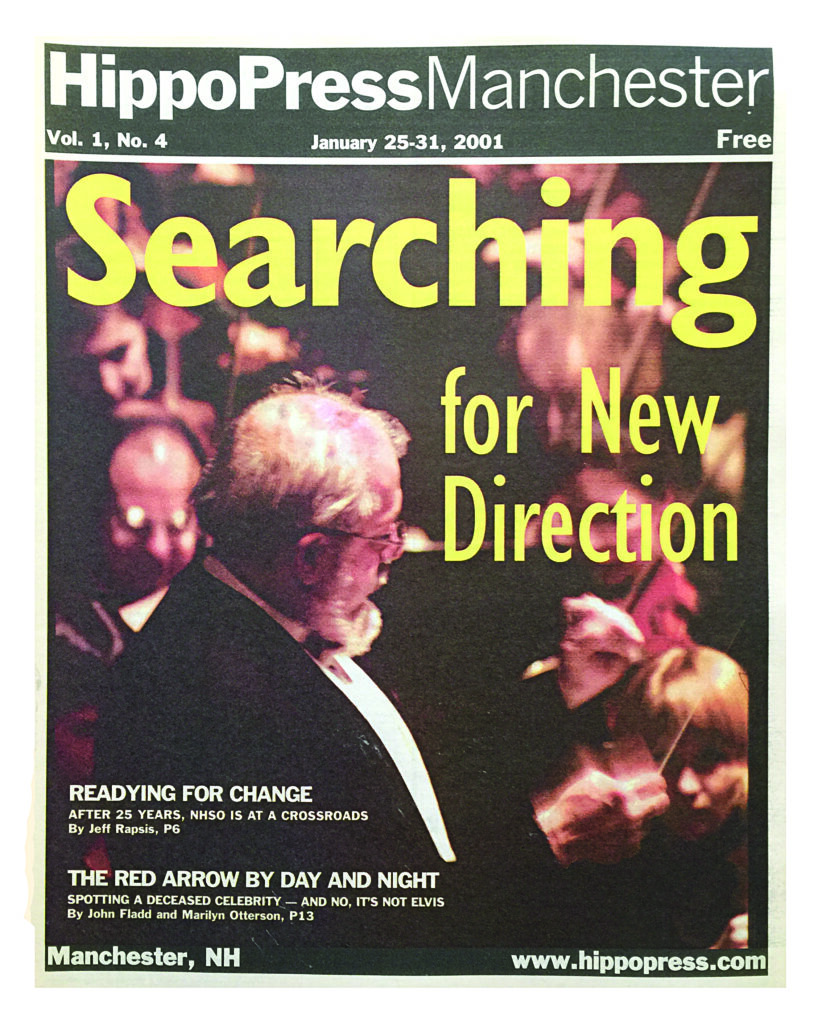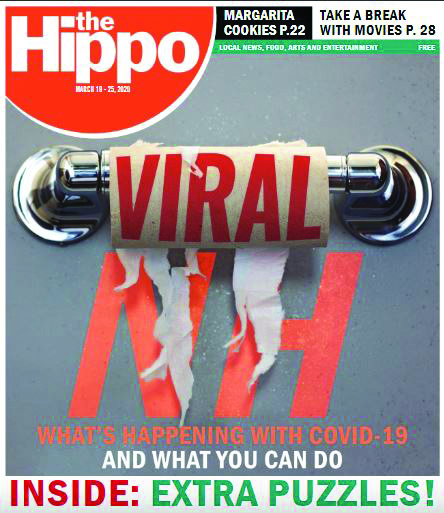A look at Hippo’s beginnings in 2001 and at Hippo in 2020

Once we committed to publishing our first issue on January 4, 2001, we had to figure out the nuts and bolts of publishing: what would we include in that first issue, how to design it, how to organize the ads, how would we make sure there were as few errors as possible. The whole process of publishing, we were learning that first year. (See my Granite Views column on page 2 for more on the Hippo’s pre-print origins.)
DAN SZCZESNY (Hippo editor at the time and co-owner) Oh man, that first issue. What’s easy to forget looking back is that we were all pretty new to Manchester. In January of 2001, I had only been in New Hampshire for two years, in Manchester for less than that. But things were happening. The hockey rink was getting built, anchor businesses like Margaritas were starting to turn the downtown vibrant. It just felt like Manchester was on the move. So, deciding on that first cover and cover story, “Morning in Manchester,” was a pretty easy call.
We didn’t have a whole lot of space in those early days. Maybe 16 pages? So, the story was just a collection of things that made the city special, including some off the beaten path highlights. I remember writing about the Merci Boxcar up on the West Side, a block from where I was living.

We rented an office that was really just a closet in a downtown Manchester building. It was so small many of our meetings spilled into the hall. We placed two $500 desktop computers, loaded with a borrowed publishing program, next to each other so we could easily coordinate as we laid out the first issues. I think it’s fair to say we weren’t really ready to publish that first issue. So that second one came up on us fast. Jeff had an idea.
JEFF RAPSIS (Associate Publisher) I had just seen a year-end news story about an etiquette expert who ranked America’s 10 most polite cities. I was all about how good manners meant good business, especially in terms of visitors and conventions. So, with the new arena under construction and Manchester preparing to welcome more visitors, I suggested a light-hearted look at how the Queen City’s manners stacked up. With the clock already ticking for next week’s deadline, no one said no. So the next thing I knew I was at Manchester Airport with a photographer friend named Al Belote, us both pretending to be clueless tourists trying to get a cab to 1000 Elm St. to see how we visitors were treated. The cabbie was very helpful at our inane questions, but the big moment came when he asked for the fare. As a test, I handed him five $100 bills. He immediately handed back four of them and then carefully counted out $85 change, thus passing with flying colors. Also, because etiquette includes helping others in need, we staged a stunt where I filled up a giant satchel with paperback books, and then I repeatedly dumped the whole load in the middle of an Elm Street crosswalk to gauge the reaction.
That got us through week two, but during the first year there were more than a few cases of a planned cover story falling through at the last minute, and I’d be dragooned into writing something. It was a wild time when we were doing anything we could think of to keep the paper compelling.

Being a shoestring operation we couldn’t afford to hire reporters, so a lot of that first year was cajoling people to donate their time to write stories. The challenge with that is that publishing requires planning and deadlines and it’s, understandably, hard to get people who are volunteering their time to do either.
RAPSIS What is startling to me is how much came to be just on a whim. You and Dan were looking for content… so I suggested rather than fill it with traditional news or traditional opinion, you package perky insider commentary under a “Quality of Life” index, where we could quantify whether something was good or bad by adding or subtracting points. I’d seen a similar feature in one of the Philadelphia weeklies. And I remember this big serious discussion about how this would possibly work: who says start it at 50? Who decides how many points?

Roles in that first year were more blurred than they are now. In mid February 2001, I wrote a cover story about the dilapidated Valley Cemetery, which I lived across the street from at the time. It was and still is a beautiful example of cemeteries as a place for the living to enjoy. That story prompted a community group to form and raise funds to repair parts of the cemetery. We felt by telling these stories we were advocating for the city.
RAPSIS Another surprising, and gratifying, thing was to see a rich and vibrant city in the process of discovering itself. Few people realize that population-wise Manchester is the largest city in northern New England — much bigger than Burlington, Vermont, or Portland, Maine, or any other city north of Boston. And for years it had been home to a vibrant food and art scene that really hadn’t been covered or pulled together in any way. Even the small scale of what Hippo did at first was enough to really open people’s eyes to Manchester as a place that mattered. A lot of stuff was going on, all just waiting to be showcased in a publication intended to do just that. So for a while we ran extensive restaurant listings, just because that itself seemed newsworthy. And we’d hear about people like attorneys at Devine Millimet going on “Hippo lunches,” visiting places they’d never heard of that were listed in that week’s paper. Eventually, we started hearing from people who moved to Manchester in part because Hippo gave them confidence about the community’s quality of life. To think that the Hippo could have that much impact on people, and the region as a whole, is really rewarding to contemplate and makes it all worthwhile.
Through all that, the Hippo we know today started to take shape.
RAPSIS Even the paper’s name was a work in progress during the first year. It was originally called “HippoPress Manchester” (what a mouthful!) for most of the first year, then shortened to “HippoPress.” But quickly people (including us) began naturally referring to it simply as “The Hippo.” So in the fall of 2001 we changed the name on the front page to call it exactly that: The Hippo. So in a way, the community helped us find the publication’s true name.
We wrote about local rock bands, the city’s diners, neighborhood markets, places to hike, visual arts at the Currier, a new skate park, community singing groups, writer groups and anything else that told the story of Manchester.
RAPSIS It may seem unbelievable now, but at the time we started Hippo, Manchester was home base for not one but two full symphony orchestras: the professional New Hampshire Symphony Orchestra, and the New Hampshire Philharmonic, which gave talented amateurs a place to perform. (We also had two opera companies!) These institutions had been maintained for years by many of the city’s leading families: long-established professionals and business owners who would give generously to support outposts of high culture in the old mill town. As a classical music fan, I always thought this was a pretty cool aspect of the Queen City that was underappreciated. So in Hippo’s first month, when we were still scrambling to find and pull together stories worthy of the cover, it turned out one of the orchestras was seeking a new conductor. So I put on my classical music hat and dove into the scene, attending pre-concert receptions in the North End homes of supporters such as David and Barbara Stahl, hobnobbing with the musicians, and generally meeting with disbelief that a publication called “HippoPress” was doing a story on classical music in Manchester. It was the cover of our fourth issue, and it caused enough of a stir to establish Hippo as the source of classical music info in Greater Manchester. (Not that this was too hard.) But it showed us the value of taking the art scene seriously, as this added readership, which added to our credibility with advertisers. It wasn’t long before classical music became a regular beat in the early Hippo, which I covered like a sportswriter would cover the local baseball team — especially the New Hampshire Symphony’s search for a new conductor, which became like a slow-motion reality show. It was enough to push me back into making music myself: first, as a stunt, I joined the chorus of a local production of the opera Carmen, which resulted in a cover story showing an insider’s look at staging an opera at the Palace Theatre. To me, it was extremely gratifying to see Hippo’s classical music coverage find an audience and be appreciated by local musicians. Eventually, the paper’s coverage gradually broadened to include balanced coverage of all arts. We still report on classical music, but alas, the scene has changed: the New Hampshire Symphony and Granite State Opera closed in 2008, while the New Hampshire Philharmonic moved to Salem. Of the big four, only Opera NH continues to give local productions.

Though we focused on arts, food, entertainment and events, we also wanted to cover news that had fallen through the cracks of other media coverage. Jeff did this with a story on the Manchester Transit Authority.
RAPSIS This was one of our first actual attempts at “investigative” journalism, which showed clearly that each year Manchester’s city government was leaving hundreds of thousands dollars of federal public transit money on the table — instead of bolstering Manchester’s sorry bus system, it was going to North Country transport services because Manchester’s aldermen were too cheap to kick in the 20 percent seed money for the 80/20 match that covered urban transit subsidies. Funny thing was, this wasn’t intended as investigative journalism, but just as a look at the city’s neglected bus system and how to get the most out of it. Instead, once I started research it was so glaringly obvious that Manchester was turning up its nose every year at big money, we just had to go with that angle. I think the Mike Flint painting used for the cover was pure genius: an MTA bus careening out of control, with dollar signs exploding out of its exhaust pipe—that told the story better than any writer could do.
Back then if you wrote for Hippo you also probably delivered issues. Everyone was out delivering papers Wednesday night and Thursday. This lasted for years until we could finally afford a professional delivery staff. In the early days, John Fladd, an early Hippo writer, and current cocktail columnist, and friend, would help me with the downtown Manchester distribution. To do those deliveries you really needed two people — even in 2001. One would drive the car and count out the papers and the other would run the papers into the delivery location.
FLADD I jump out of the car and jog not-very-enthusiastically to the door of the bar. I go in and look around for a table near the back, without anyone sitting at it. I take three or four steps and drop the pile of papers on the table.”HIPpo Press!” I announce, then turn to leave the bar, which has gone momentarily silent. “We love you guys!” a man shouts from the other side of the room.
As the weeks went on in 2001 it got easier for us to publish. We were developing ways to handle all of the information that went into each paper. We got ahead enough to create a college guide and to plan a photo essay. We still struggled with deadlines and my personal health suffered as the paper took over every bit of my life. I think I gained 30 pounds that year and got very little sleep. But it was really fun.

After that first year, the paper grew, changed over the years, added professional staff — but to some extent the focus stayed the same: covering arts, entertainment and quality of life. In our 20th year we suddenly found ourselves back in a situation like 2001 — almost having to start from scratch with what we were covering and how we covered it. By the middle of March the very things that we cover, arts, entertainment, theater, music, restaurants, and events, had ground to a halt. How do you publish an arts and entertainment magazine when there aren’t a lot of arts and entertainment?
ANGIE SYKENY (Hippo’s arts reporter) On March 11 of last year, I emailed my editor to let her know that an event I was covering for the upcoming paper had been canceled out of caution about this “coronavirus thing.” I hope this isn’t going to become a trend. If things keep getting canceled, what am I going to write about? Within a week, all manner of routine had gone out the window, and I, the arts writer, found myself writing less about art and more about community health, emergency relief funds and remote education.

MEGHAN SIEGLER (Hippo’s managing editor) I remember going to your office on March 12 to tell you that I was starting to have concerns about events being canceled. How were we going to fill the paper if everything we wrote about was no longer happening? Things quickly went downhill after that conversation. The sheer number of “emergency!/help!/new plan!” emails flying back and forth between myself, Amy and our reporters and freelancers between March 12 and March 17 was insane. I sent one to my reporters that Saturday with the subject “Good news and bad news.” It was a detailed plan of all the changes we needed to make for the March 19 paper. The “good” news was that they could stop working on pretty much anything they had been working on. The bad news was that we needed to, very quickly, create content with the most up-to-date information — but that information was changing constantly.
AMY DIAZ (Hippo’s executive editor) On the morning of Friday, March 13, we were working on an issue with a cover story that involved different out-of-your-comfort-zone activities, all at venues out in the world. By the end of that day, a day full of canceled events, closed venues and notices of school closings, we realized that the entire paper, which by Friday is pretty close to being what you see when it hits stands the next week, would have to be redone. Even stories that could still run had to be reworked to acknowledge that a performance had been postponed or that an event was moving online.
SIEGLER The March 19 paper was essentially created in two work days. We came up with a “Viral NH” cover story that included pieces like “Social distancing and beer” (from Jeff Mucciarone) and “Self-isolation blues — and other local music to listen to at home” (from Michael Witthaus), plus a gigantic list of events that had been postponed or canceled that we had to keep adding to right up until we sent the paper to the printer.
MATT INGERSOLL (Hippo’s food reporter) Our annual coverage of New Hampshire Maple Weekend was the lead story in the Hippo’s food section when, seemingly overnight, the effects of the pandemic began to overspread the state. I received an email from my event contact on a Monday morning, the day before we were to go to print with that week’s issue, that Maple Weekend had been canceled. A complete rewrite of my story became necessary, with the focus switching from going out to enjoy a tour at your local sugarhouse to fun things you can do with local maple syrup in the safety of your own home kitchen.
Our advertising team faced the same challenge. We were past deadline when Gov. Chris Sununu issued a shutdown order that closed nearly 70 percent of the businesses, nonprofits and events that typically advertise. We started calling all of our advertisers asking them what they wanted us to do.
CHARLENE NICHOLS (Hippo’s advertising manager) It was the strangest feeling … one minute I’m selling and building ads and the next I’m killing them. It seemed to happen all at once. As a consultant, I felt desperate to help my businesses, whether to rewrite their messages and plans or to pull their ads completely. I was so worried about how they’d survive and then, later, as a salesperson, um, what’s going to happen to me? The Hippo?
DIAZ I am extremely proud of how everybody at the paper, the editorial and production staff but also our colleagues in advertising and distribution, came together and worked so hard through that first anxious weekend to produce that “Viral NH” issue.
On the ad and revenue side it was a pretty big hit — 65 percent of our revenue disappeared instantly. I wondered, can we even keep publishing? Should we shut down? But the more I thought about and sought out counsel, the more I realized that if we could we must publish. We had a job to do and our readers needed us to continue.
DIAZ As a paper whose primary mission is to help you find things to do and places to go, what do we focus on when everything is canceled and nothing is open? I thought that, whatever we did and however we went with the flow of events, our core should continue to be connecting readers to the scenes that have always been the most important to our coverage — the visual and performing arts, classical and popular music, books and the literary scene, nightlife, outdoor activities and the local food scene. And food — restaurants and their survival — was about to become one of the biggest stories, not just locally but nationally, of the economic impacts of the pandemic. I think it’s fitting that after that first Covid issue, our next two issues —“Keep Calm and Carry Out” and “Meanwhile, on the Farm” — focused on the adaptations of different aspects of the local food economy.
INGERSOLL Food-focused events scheduled for April, May and into the summer were being canceled or postponed one by one, having a dramatic effect on our coverage. In place of a weekend food festival or a restaurant grand opening, I’d instead write about a virtual or stay-at-home event, or I’d be covering the fallout of restaurants.

SIEGLER It hasn’t been all bad. Having a smaller staff has forced us all to redefine our roles to some degree; for me, that means that for the first time in years I’m doing some writing. Over the summer, for example, Amy asked if I’d be willing to write a cover story about running, and at first I said no. I read words and I fix words, but I had my doubts as to whether I could still write words. But Amy knows I’m kind of obsessed with running, and she probably knew that I’d eventually say yes specifically for that reason, which I did — and I kind of loved the whole experience. As it turns out, I’ve missed writing. So while the past year has taken me out of my comfort zone, I definitely don’t regret experiences like that.
Like many organizations out there the pandemic made things that had been routine much more difficult. On the distribution side, the folks that get out the Hippo each week, many of our drop locations were suddenly closed. My distribution manager kept calling me and saying we have a real problem here. He put a plan in place in a few days that shifted more copies away from the closed restaurants and cafes and into the supermarkets and our street boxes.
I can look back on 2020 and say that was a really horrible year, and it was. We say our revenue declined 65 percent and we had to lay off wonderful people. But I also look at it and say we survived and I’m so very grateful that our staff kept focused on putting out the best Hippo we could. This was also the first time in our 20 years that we asked readers to help financially contribute to Hippo either through a membership or donation. And they did and have continued to do so.
I don’t know if I’ll be here for our 40th anniversary, but someone will be. Southern New Hampshire continues to need professional independent food, news, arts and entertainment coverage. And we at Hippo will continue to provide that with the support of our staff, our community and our readers.
This story was possible with the generous financial support of Hippo readers. Hippo is very grateful to have the support of its readers. If you haven’t contributed yet, please consider a small contribution. Your contributions allow Hippo to write more stories and gets you access to additional stories and columns.





